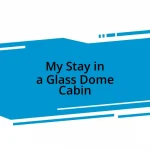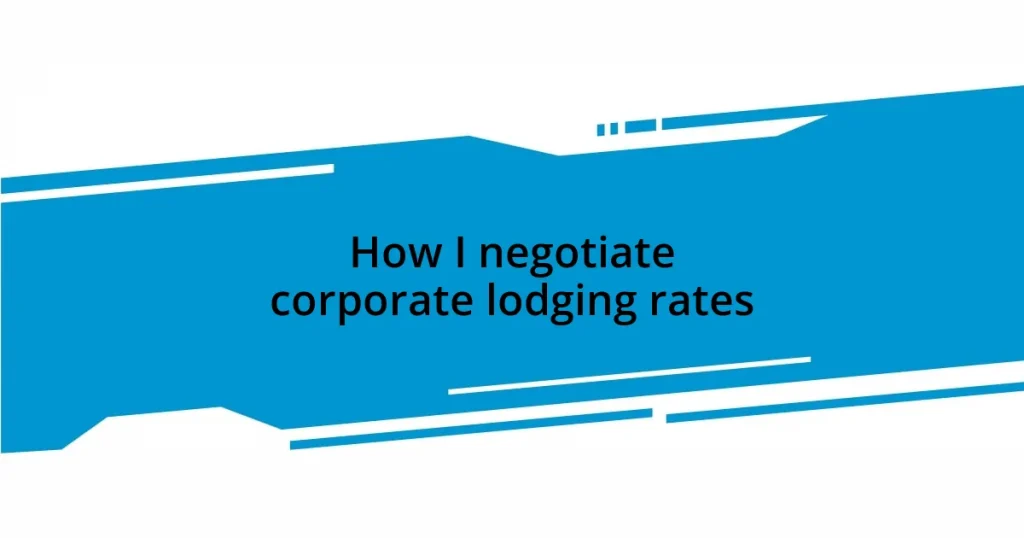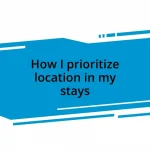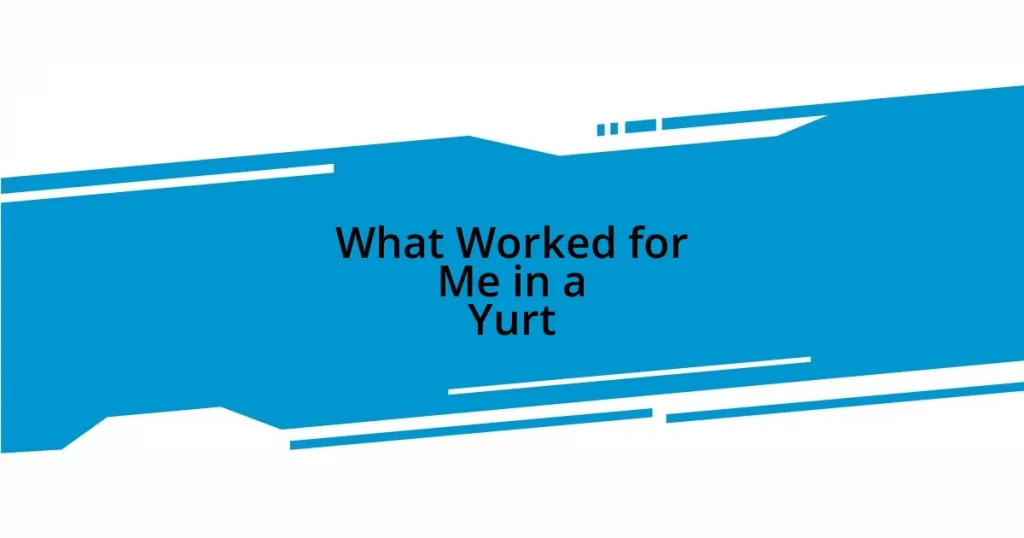Key takeaways:
- Understanding corporate lodging rates is crucial; they often reflect a company’s business volume and can be negotiated based on factors like seasonality and location demand.
- Identifying negotiation leverage, such as travel volume and competitive offers, can significantly improve negotiation outcomes.
- Researching market trends helps predict pricing fluctuations and locate competitive hotel options, enhancing negotiation confidence.
- Building rapport with hotel partners through personal connections and clear communication fosters better long-term relationships and negotiation success.
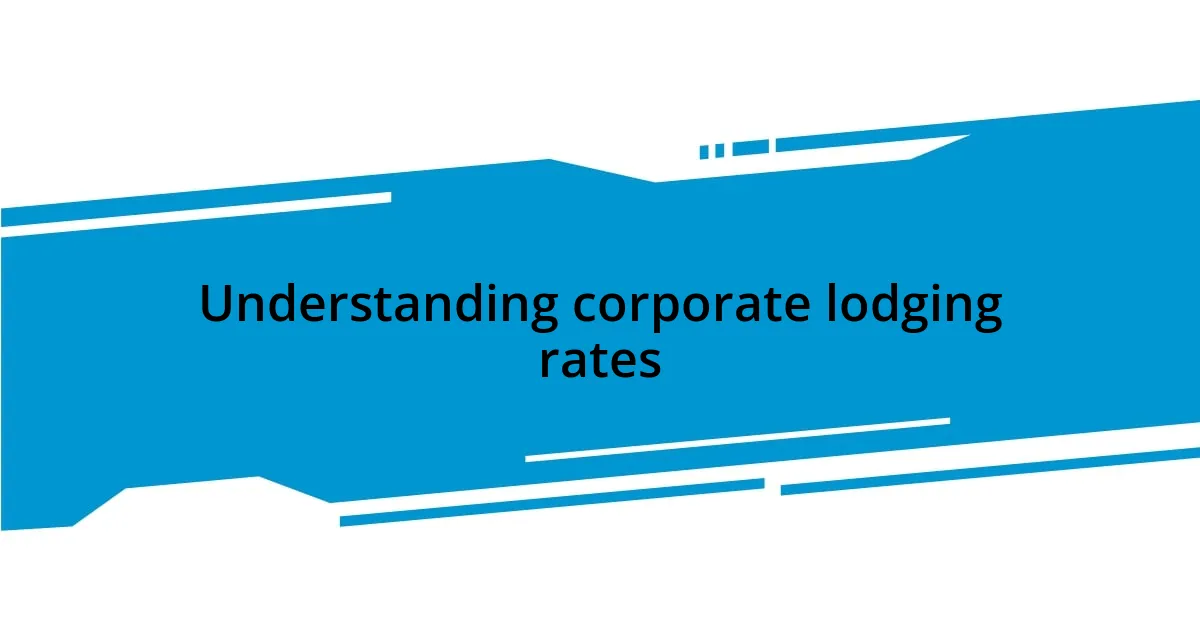
Understanding corporate lodging rates
Understanding corporate lodging rates can initially seem daunting, but once you break it down, it’s quite manageable. For instance, I remember the first time I negotiated a rate for a team trip. I felt overwhelmed by the myriad of numbers and options, but I quickly realized that these rates often reflect the volume of business a company brings to a hotel. Knowing that gave me a solid footing when discussing terms.
There’s also the layer of understanding the factors that influence these rates. Things like seasonality, location demand, and even the nature of your organization can all play significant roles. I’ve often found that engaging directly with hotel managers can uncover hidden opportunities to negotiate better rates based on these fluctuating factors. Have you ever turned a simple conversation about amenities into a substantial rate reduction? I have, and it was exhilarating to see how my willingness to ask transformed just a basic query into solid savings.
Lastly, consider the potential for long-term partnerships with hotels. When I first approached a corporate lodging agreement, I viewed it as a one-off transaction. I soon discovered that hotels value loyalty; preferential rates often come with a commitment to future bookings. Building that rapport not only eased my negotiation stress but also fostered a sense of community—a feeling I didn’t expect in such a transactional environment. Has establishing such relationships changed how you view corporate lodging? It definitely reshaped my perspective.
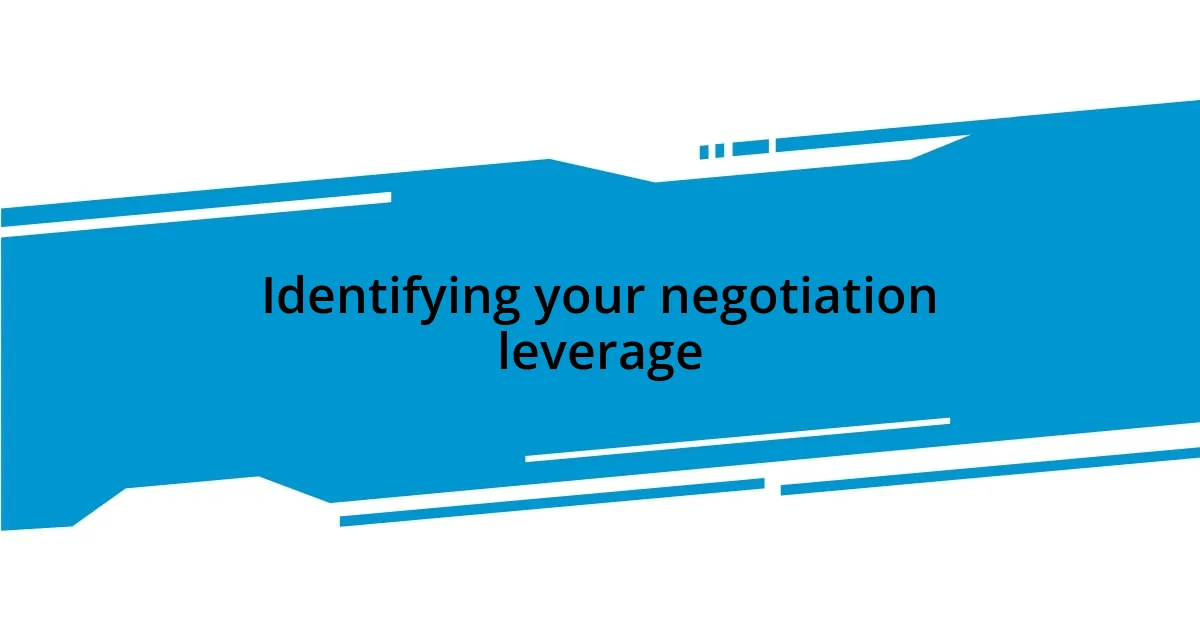
Identifying your negotiation leverage
Identifying your negotiation leverage often requires introspection and clear understanding. When I first embarked on a negotiation journey, I realized that my company’s travel frequency was a pivotal factor. The more I could articulate our travel needs, the better positioned I was to negotiate favorable rates. Have you considered your organization’s travel volume? It can be a game changer in discussions with hotel representatives.
Another layer of leverage lies in understanding the competitive landscape. I once noted how a nearby hotel was offering a promotion for specific corporate partners. This insight prompted me to leverage these promotions to secure better terms at my preferred hotel. Do you keep track of what surrounding competitors are offering? It can empower you greatly in negotiations and give you an edge.
Lastly, consider the timing of your negotiations. I learned this the hard way; attempting to negotiate during peak seasons left me with limited options. Instead, I began focusing my discussions during off-peak times when hotels were eager for business. Have you tried negotiating off-season? It’s surprising how much more flexible hotels can be when they’re less busy.
| Your Leverage | Description |
|---|---|
| Travel Volume | Frequent travelers often receive better rates due to repeat business. |
| Competitive Offers | Knowledge of nearby hotels’ promotions can enhance your negotiation position. |
| Timing | Negotiating during off-peak seasons typically leads to more favorable terms. |
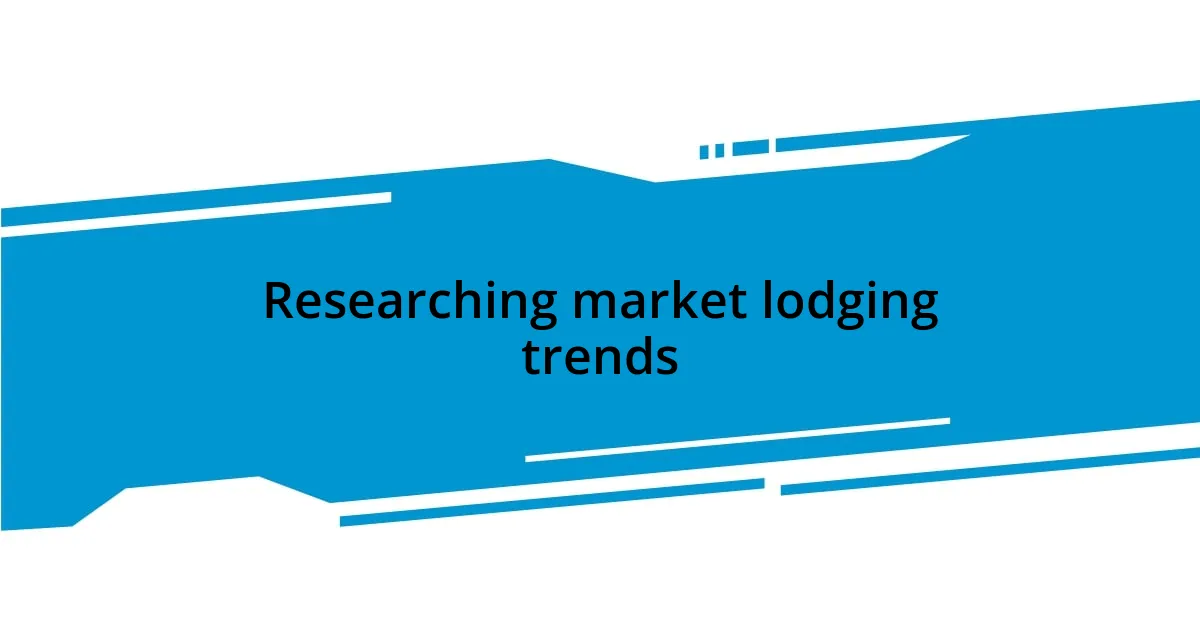
Researching market lodging trends
Researching market lodging trends is essential for making informed decisions when negotiating rates. I remember when I first dove into this aspect of corporate lodging; it felt like uncovering a treasure trove of information. Understanding trends can help pinpoint when rates are likely to fluctuate and reveal which hotel chains consistently provide competitive pricing. It gave me a new layer of confidence during my negotiations.
Here are some key trends to keep in mind:
- Market Demand Shifts: Being aware of local events or conferences can impact pricing substantially.
- Seasonal Variations: Rates often rise during peak travel seasons. Researching when those peaks occur can provide leverage.
- Economic Factors: An understanding of the local economy can help identify better deals; for example, a slowing market may lead hotels to offer lower rates to attract business.
Additionally, I often find local accommodation websites or travel blogs can provide unfiltered insights. I stumbled upon an online forum where frequent travelers discussed hidden gems and rock-bottom prices. The camaraderie of sharing these experiences made me realize that pooling knowledge can lead to more significant savings. Have you ever thought about how a simple online search might change your bargaining power? It did wonders for me.
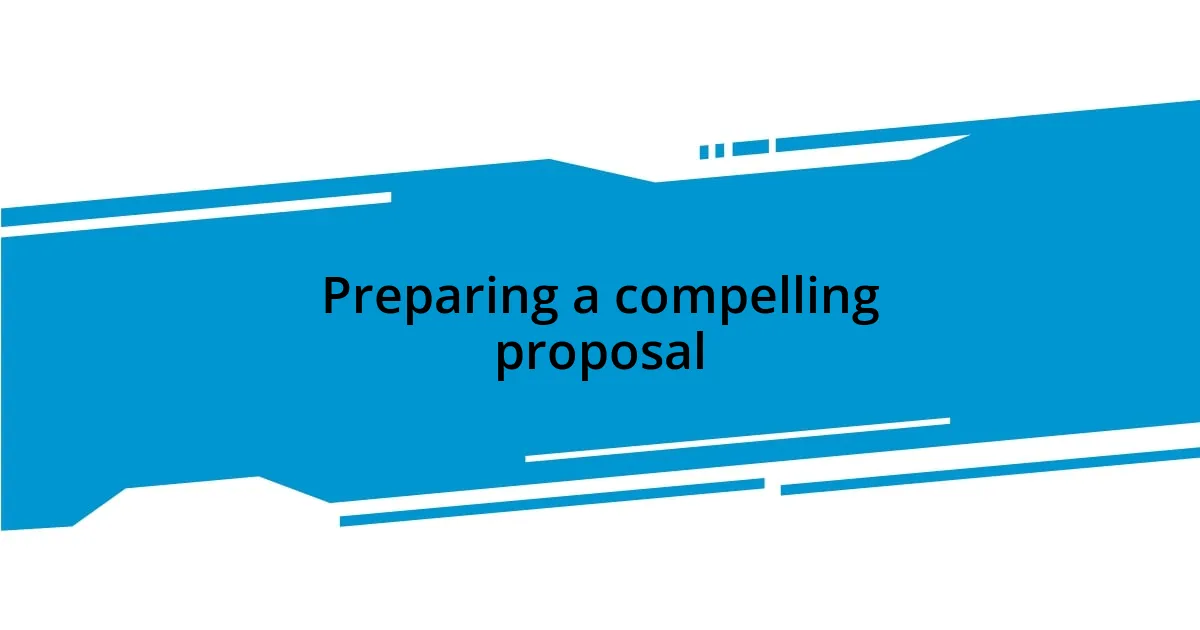
Preparing a compelling proposal
When preparing a compelling proposal, clarity is key. I’ve found that articulating our specific needs upfront—like room types and amenities—helps establish a strong foundation. Have you ever noticed how details paint a clearer picture? The more precise I am, the better hotels can respond to my requests.
Another powerful aspect is presenting data to support your proposal. I vividly recall an instance where I gathered occupancy rates from local hotels, showcasing my findings in a neat graph. This visual aid not only illustrated the competitive landscape but also highlighted opportunities for our partnership. Have you considered how visual data might enhance your discussions? It certainly made mine more persuasive.
Finally, I can’t stress enough the importance of emphasizing the long-term relationship potential. On one occasion, I shared how our growing travel needs could translate into consistent bookings for the hotel. Seeing their eyes light up at the prospect of future business was a game changer. Don’t underestimate how the promise of sustained collaboration can influence negotiations; it creates mutual benefits that hotels can’t easily ignore.
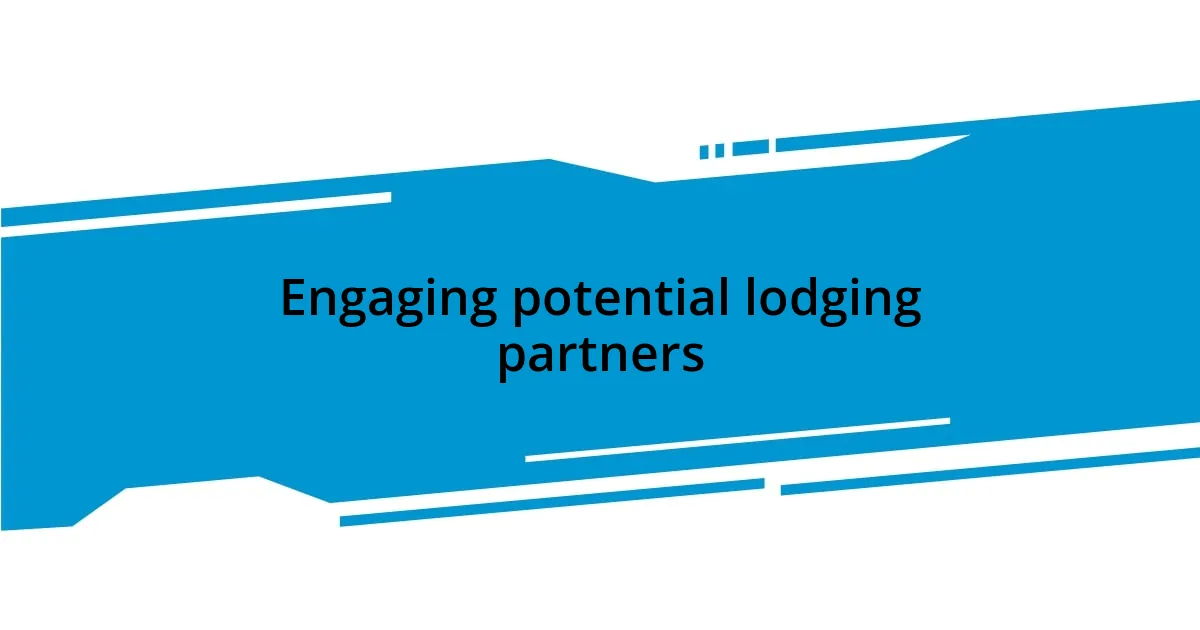
Engaging potential lodging partners
When I first set out to engage potential lodging partners, I discovered that building rapport goes a long way. I remember a casual lunch I had with a hotel manager who shared stories about their property’s history. These moments of personal connection not only made me feel more invested but also fostered a sense of trust that proved invaluable during negotiations. Have you ever noticed how a little genuine conversation can open doors?
Another strategy I’ve employed is to come prepared with questions that reflect an interest in their needs as well. I’m a firm believer that negotiation isn’t just about what I want. During one negotiation, I asked the manager about their peak seasons and how we could collaborate to fill rooms during quieter times. That question led to brainstorming creative solutions, turning our discussion into a partnership opportunity rather than a simple transaction. It’s amazing how asking the right questions can shift the landscape in your favor.
Additionally, I’ve found that showcasing my understanding of their challenges can engage potential partners more effectively. In one instance, I mentioned how I admired their hotel’s unique amenities and even shared insights into how those features aligned with the interests of my traveling employees. It felt rewarding to highlight what they excel at while subtly connecting it to our business needs. Have you tried to position your requests within the larger context of mutual benefits? It really can make all the difference.
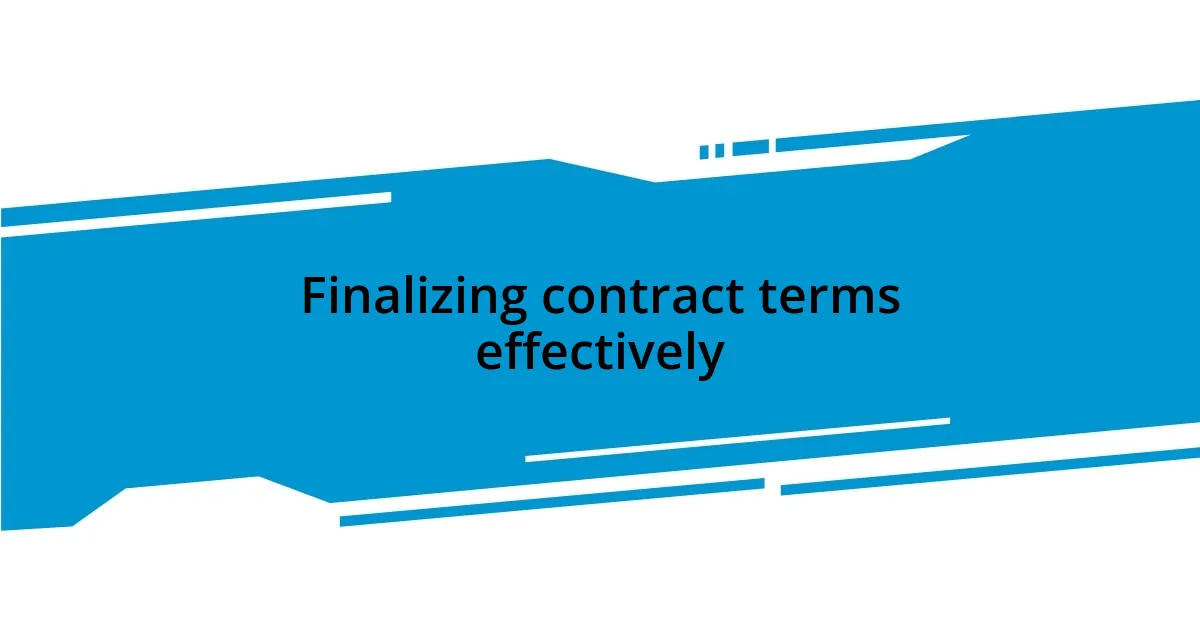
Finalizing contract terms effectively
It’s crucial to approach the finalization of contract terms with a focus on clarity and mutual agreement. I recall a negotiation where we meticulously outlined every detail—from cancellation policies to billing cycles. This level of transparency not only alleviated anxiety about unexpected costs but also solidified our trust in the partnership. Have you ever experienced the relief that comes from knowing exactly what to expect?
In my experience, it’s essential to be open to discussing terms that may seem non-negotiable at first glance. During one particular negotiation, I suggested a flexible payment plan that worked better for our cash flow while still meeting the hotel’s needs. Their willingness to consider alternatives made me appreciate the partnership more, and I realized that finding common ground often opens doors to more significant concessions. What strategies have you found effective when discussing seemingly rigid terms?
Lastly, I’ve learned the power of reiterating key points before signing the contract. A few years back, I was finalizing a deal and took a moment to summarize our agreed-upon terms, highlighting both parties’ benefits. This simple step not only reinforced our shared understanding but also ensured we were on the same page moving forward. It’s those moments of reflection that can dramatically elevate the success of your negotiations. Have you ever taken that extra minute to review before sealing the deal? It truly can make a difference.
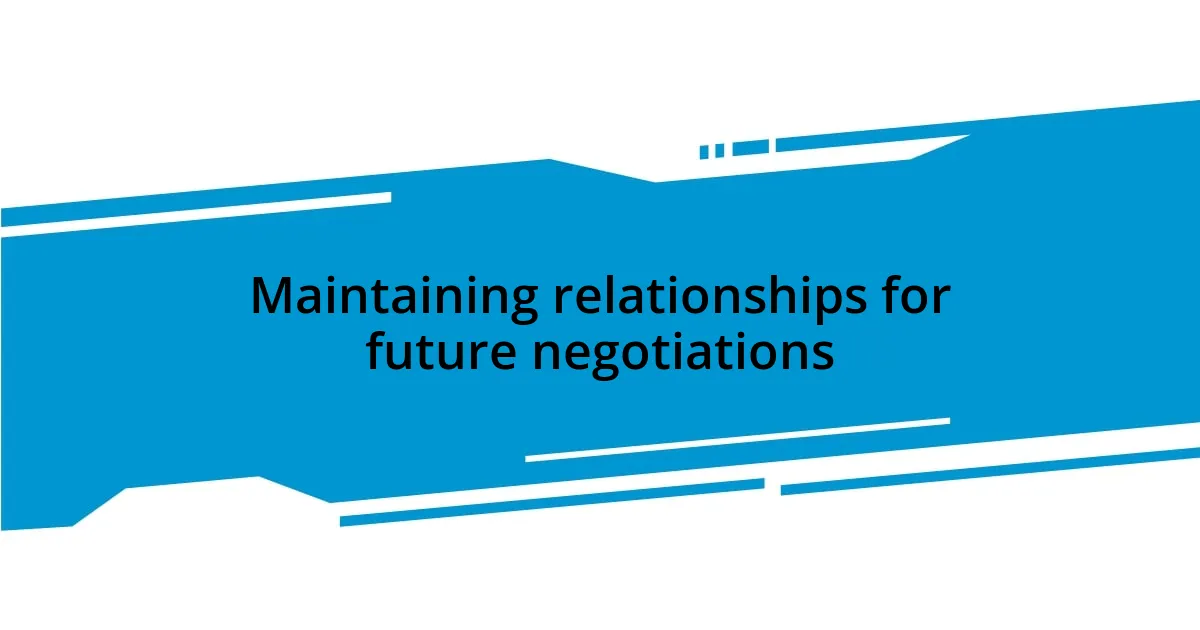
Maintaining relationships for future negotiations
Building and maintaining relationships is essential for successful future negotiations. In one of my experiences, I left a hotel after a negotiation and sent a thank-you note the next day. It might seem simple, but that personal touch paid off. A few months later, I approached them with a new request, and the manager remembered our interaction fondly. Isn’t it interesting how a small gesture can pave the way for smoother conversations later on?
In my view, following up after a negotiation is another powerful strategy. I often take a moment to check in on the status of the arrangement, even if everything is running smoothly. On one occasion, I reached out to see how they were handling a busy season we had discussed, and the hotel manager appreciated my inquiry. It was more than a business check-in; it transformed into a discussion about ways we could better collaborate in the future. How do you maintain those connections after your initial talks?
Lastly, I’ve realized the importance of being approachable and open to feedback. During a recent renewal negotiation, I asked for their insights on how we could improve our partnership. The honest feedback I received helped me tweak our requests, making them more in line with what they could realistically offer. It’s these kinds of dialogues that build lasting bridges, right? When both parties feel heard, the path for future negotiations becomes much easier.









